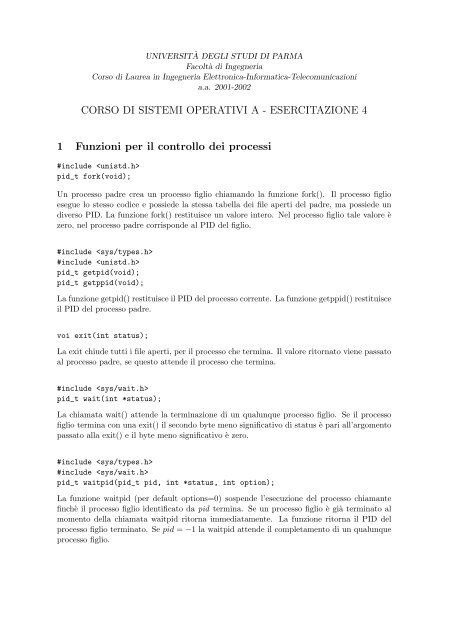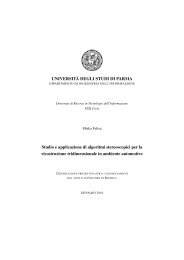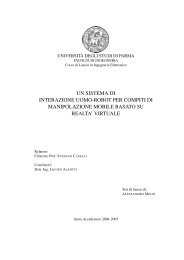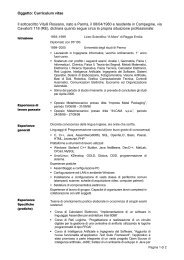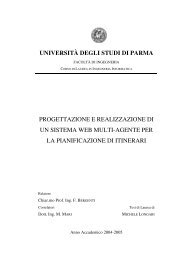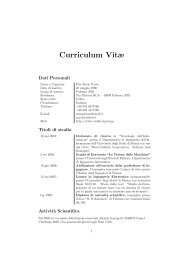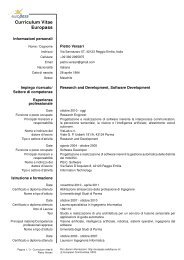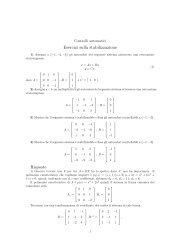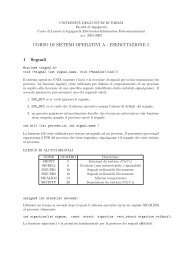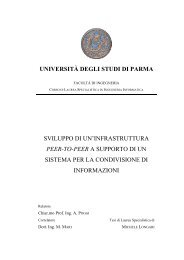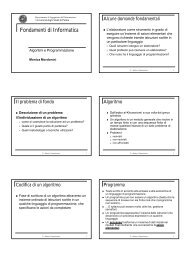UNIX: testo della esercitazione 4 in laboratorio su primitive per la ...
UNIX: testo della esercitazione 4 in laboratorio su primitive per la ...
UNIX: testo della esercitazione 4 in laboratorio su primitive per la ...
Create successful ePaper yourself
Turn your PDF publications into a flip-book with our unique Google optimized e-Paper software.
UNIVERSITÀ DEGLI STUDI DI PARMA<br />
Facoltà di Ingegneria<br />
Corso di Laurea <strong>in</strong> Ingegneria Elettronica-Informatica-Telecomunicazioni<br />
a.a. 2001-2002<br />
CORSO DI SISTEMI OPERATIVI A - ESERCITAZIONE 4<br />
1 Funzioni <strong>per</strong> il controllo dei processi<br />
#<strong>in</strong>clude <br />
pid_t fork(void);<br />
Un processo padre crea un processo figlio chiamando <strong>la</strong> funzione fork(). Il processo figlio<br />
esegue lo stesso codice e possiede <strong>la</strong> stessa tabel<strong>la</strong> dei file a<strong>per</strong>ti del padre, ma possiede un<br />
diverso PID. La funzione fork() restituisce un valore <strong>in</strong>tero. Nel processo figlio tale valore è<br />
zero, nel processo padre corrisponde al PID del figlio.<br />
#<strong>in</strong>clude <br />
#<strong>in</strong>clude <br />
pid_t getpid(void);<br />
pid_t getppid(void);<br />
La funzione getpid() restituisce il PID del processo corrente. La funzione getppid() restituisce<br />
il PID del processo padre.<br />
voi exit(<strong>in</strong>t status);<br />
La exit chiude tutti i file a<strong>per</strong>ti, <strong>per</strong> il processo che term<strong>in</strong>a. Il valore ritornato viene passato<br />
al processo padre, se questo attende il processo che term<strong>in</strong>a.<br />
#<strong>in</strong>clude <br />
pid_t wait(<strong>in</strong>t *status);<br />
La chiamata wait() attende <strong>la</strong> term<strong>in</strong>azione di un qualunque processo figlio. Se il processo<br />
figlio term<strong>in</strong>a con una exit() il secondo byte meno significativo di status è pari all’argomento<br />
passato al<strong>la</strong> exit() e il byte meno significativo è zero.<br />
#<strong>in</strong>clude <br />
#<strong>in</strong>clude <br />
pid_t waitpid(pid_t pid, <strong>in</strong>t *status, <strong>in</strong>t option);<br />
La funzione waitpid (<strong>per</strong> default options=0) sospende l’esecuzione del processo chiamante<br />
f<strong>in</strong>chè il processo figlio identificato da pid term<strong>in</strong>a. Se un processo figlio è già term<strong>in</strong>ato al<br />
momento <strong>del<strong>la</strong></strong> chiamata waitpid ritorna immediatamente. La funzione ritorna il PID del<br />
processo figlio term<strong>in</strong>ato. Se pid = −1 <strong>la</strong> waitpid attende il completamento di un qualunque<br />
processo figlio.
#<strong>in</strong>clude <br />
unsigned <strong>in</strong>t sleep(unsigned <strong>in</strong>t secs);<br />
La funzione sleep sospende un processo <strong>per</strong> un <strong>per</strong>iodo di tempo pari a secs secondi.<br />
<strong>in</strong>t execv(char *file_name, *argv[]);<br />
La primitiva execv non produce nuovi processi ma solo il cambiamento dell’ambiente del<br />
processo <strong>in</strong>teressato. Il processo corrente passa ad eseguire un nuovo comando il cui path è<br />
specificato dal primo argomento file name. Il secondo argomento è un puntatore ad una lista<br />
di puntatori a carattere che rappresenta <strong>la</strong> l<strong>in</strong>ea di comando.<br />
<strong>in</strong>t execve(char *file_name, *argv[], *envp[]);<br />
La primitiva execve ha lo stesso comportamento di execv. L’unica differenza è <strong>la</strong> presenza di<br />
un terzo parametro (puntatore ad una lista di puntatori a carattere) che consente di specificare<br />
le variabili d’ambiente del nuovo programma.<br />
2 Esempi<br />
Tutti i file con il codice sorgente degli esercizi proposti (es∗.c) si trovano nel direttorio:<br />
/home/soa/eserc4<br />
Esercizio<br />
1: padre e figlio<br />
#<strong>in</strong>clude <br />
<strong>in</strong>t ma<strong>in</strong>()<br />
{<br />
pr<strong>in</strong>tf("Sono il processo %d e sono figlio di %d\n", getpid(), getppid());<br />
}<br />
Esercizio<br />
2: codice diverso tra padre e figlio<br />
#<strong>in</strong>clude <br />
<strong>in</strong>t ma<strong>in</strong>()<br />
{<br />
<strong>in</strong>t pid;<br />
if ((pid=fork()) < 0)<br />
{<br />
<strong>per</strong>ror("fork error");<br />
exit(1);
}<br />
}<br />
else<br />
if (pid == 0)<br />
{/* CODICE ESEGUITO DAL FIGLIO */<br />
pr<strong>in</strong>tf("Sono il processo figlio con PID=%d\n", getpid());<br />
}<br />
else<br />
{/* CODICE ESEGUITO DAL PADRE */<br />
pr<strong>in</strong>tf("Sono il processo padre con PID=%d\n", getpid());<br />
}<br />
Esercizio<br />
sleep()<br />
3: come il precedente, ma con qualche variabile <strong>in</strong> più e l’uso <strong>del<strong>la</strong></strong><br />
#<strong>in</strong>clude <br />
#<strong>in</strong>clude <br />
#<strong>in</strong>clude <br />
#<strong>in</strong>clude <br />
<strong>in</strong>t ma<strong>in</strong> ()<br />
{<br />
<strong>in</strong>t pid, status;<br />
<strong>in</strong>t myvar = 1;<br />
}<br />
if ((pid = fork()) < 0)<br />
{<br />
<strong>per</strong>ror("fork error");<br />
exit(1);<br />
}<br />
else<br />
if (pid==0)<br />
{<br />
sleep(2);<br />
myvar = 2;<br />
pr<strong>in</strong>tf("Figlio: sono il processo %d e sono figlio di %d \n",<br />
getpid(), getppid());<br />
pr<strong>in</strong>tf("myvar: %d \n", myvar);<br />
exit(0);<br />
}<br />
else<br />
{<br />
wait(&status);<br />
pr<strong>in</strong>tf("Padre: sono il processo %d e sono figlio di %d \n",<br />
getpid(), getppid());<br />
pr<strong>in</strong>tf("Padre: status = %d \n", WEXITSTATUS(status));<br />
pr<strong>in</strong>tf("myvar: %d \n", myvar);<br />
}
Esercizio 4:<br />
#<strong>in</strong>clude <br />
#<strong>in</strong>clude <br />
<strong>in</strong>t ma<strong>in</strong>()<br />
{<br />
pid_t pid;<br />
}<br />
if ((pid=fork()) < 0)<br />
{<br />
<strong>per</strong>ror("fork error\n");<br />
exit(1);<br />
}<br />
pr<strong>in</strong>tf("ciao, pid vale %d!\n", pid);<br />
exit(0);<br />
Modificare il programma aggiungendo altre fork(), verificando che il numero dei processi<br />
generati cresce esponenzialmente. Modificare il programma stampando il vero PID di ogni<br />
processo utilizzando <strong>la</strong> funzione getpid().<br />
Esercizio 5: Il processo figlio crea un nuovo file (il cui nome deve essere specificato<br />
come argomento), il processo padre attende il completamento del figlio e<br />
<strong>su</strong>ccessivamente legge il contenuto del file.<br />
#<strong>in</strong>clude <br />
#<strong>in</strong>clude <br />
#def<strong>in</strong>e N 256<br />
<strong>in</strong>t ma<strong>in</strong> (<strong>in</strong>t argc, char **argv)<br />
{<br />
<strong>in</strong>t nread, nwrite = 0, atteso, status, fileh, pid;<br />
char st1[N];<br />
char st2[N] = "";<br />
/* APERTURA IN LETTURA/SCRITTURA */<br />
fileh = open(argv[1], O_CREAT|O_RDWR|O_TRUNC, 0644);<br />
if (fileh == -1)<br />
<strong>per</strong>ror("open error");<br />
if((pid=fork()) < 0)<br />
{<br />
<strong>per</strong>ror("fork error");<br />
close(fileh);<br />
exit(-1);<br />
}<br />
else if (pid==0)
{<br />
/* FIGLIO: legge una str<strong>in</strong>ga che l’utente immette da tastiera */<br />
scanf("%s",st1);<br />
nwrite = write(fileh, st1, strlen(st1));<br />
if (nwrite == -1)<br />
<strong>per</strong>ror("write error");<br />
exit(0);<br />
}<br />
else<br />
{<br />
atteso=wait(&status); /* ATTESA DEL FIGLIO */<br />
lseek(fileh, 0, SEEK_SET);<br />
nread = read(fileh, st2, N);<br />
if (nread == -1)<br />
<strong>per</strong>ror("read error");<br />
pr<strong>in</strong>tf("nread=%d\n",nread);<br />
pr<strong>in</strong>tf("Il figlio ha scritto <strong>la</strong> str<strong>in</strong>ga %s\n", st2);<br />
close(fileh);<br />
return(0);<br />
}<br />
}<br />
exit(0);<br />
Esercizio<br />
6: il padre crea N figli e aspetta <strong>la</strong> f<strong>in</strong>e dal<strong>la</strong> loro esecuzione<br />
#<strong>in</strong>clude <br />
#<strong>in</strong>clude <br />
#<strong>in</strong>clude <br />
#def<strong>in</strong>e N 8<br />
<strong>in</strong>t ma<strong>in</strong>()<br />
{<br />
<strong>in</strong>t status, i;<br />
pid_t pid;<br />
/* IL PADRE CREA N PROCESSI FIGLI */<br />
for (i=0; i 0)<br />
{<br />
if (WIFEXITED(status)) /* ritorna 1 se il figlio ha term<strong>in</strong>ato correttamente */<br />
pr<strong>in</strong>tf("Il figlio %d ha term<strong>in</strong>ato correttamente con exit status=%d\n",
}<br />
pid, WEXITSTATUS(status));<br />
else<br />
pr<strong>in</strong>tf("Il figlio %d non ha term<strong>in</strong>ato correttamente\n",pid);<br />
}<br />
exit(0);<br />
Modificare il programma <strong>in</strong> modo tale che il processo padre attenda il completamento dei<br />
processi figli nello stesso ord<strong>in</strong>e <strong>in</strong> cui sono stati creati.<br />
Esercizio<br />
7: utilizzo di execv()<br />
#<strong>in</strong>clude <br />
#<strong>in</strong>clude <br />
<strong>in</strong>t ma<strong>in</strong>()<br />
{<br />
<strong>in</strong>t status;<br />
pid_t pid;<br />
char* arg[]= {"ls", "-l", "/usr/<strong>in</strong>clude"};<br />
if ((pid=fork())==0)<br />
{<br />
/* CODICE ESEGUITO DAL FIGLIO */<br />
execv("/b<strong>in</strong>/ls", arg);<br />
/* Si torna solo <strong>in</strong> caso di errore */<br />
exit(-1);<br />
}<br />
else<br />
{<br />
/* CODICE ESEGUITO DAL PADRE */<br />
wait(&status);<br />
pr<strong>in</strong>tf("exit di %d con %d\n", pid, status);<br />
}<br />
}<br />
exit(0);<br />
Esercizio<br />
8: Il programma richiede <strong>la</strong> presenza di due file di <strong>testo</strong> f1 e f2<br />
#<strong>in</strong>clude <br />
#<strong>in</strong>clude <br />
<strong>in</strong>t ma<strong>in</strong>()<br />
{<br />
<strong>in</strong>t status;<br />
pid_t pid;<br />
char *env[] = {"TERM=vt100", "PATH=/b<strong>in</strong>:/usr/b<strong>in</strong>", (char *) 0 };
char *args[] = {"cat", "f1", "f2", (char *) 0};<br />
if ((pid=fork())==0)<br />
{<br />
/* CODICE ESEGUITO DAL FIGLIO */<br />
execve("/b<strong>in</strong>/cat", args, env);<br />
/* Si torna solo <strong>in</strong> caso di errore */<br />
exit(-1);<br />
}<br />
else<br />
{<br />
/* CODICE ESEGUITO DAL PADRE */<br />
wait(&status);<br />
pr<strong>in</strong>tf("exit di %d con %d\n", pid, status);<br />
}<br />
}<br />
exit(0);<br />
Esercizio<br />
proposto:<br />
Realizzare un programma C con le seguenti caratteristiche:<br />
1. deve creare un processo figlio<br />
2. il processo figlio deve eseguire il comando passato come argomento al programma<br />
esempio: ./run cp file1.txt file2.txt<br />
esempio: ./run rm file1.txt<br />
[nei precedenti esempi, run è l’eseguibile che dovete creare]<br />
3. il processo padre attende il completamento del figlio.


